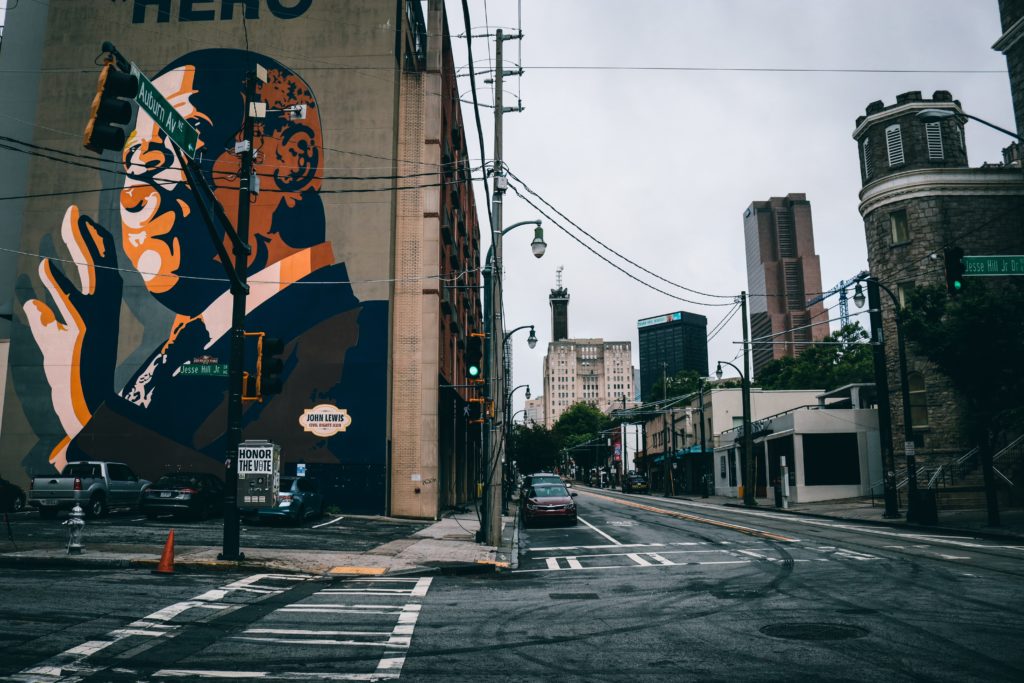
Last week, Representative John Lewis lay in state at the Capitol Rotunda, the first Black Congressman to be honored in this way. After a poignant ceremony, his body was moved outside to the Capitol steps, where every-day people could pay their respects.
Lewis, who died of pancreatic cancer on July 17, was called “John the Optimist.” Throughout the uprisings in the Jim Crow South, he played an important role, first as one of the original 13 Freedom Riders (and one of the first to be violently assaulted, in a whites-only waiting room in Rock Hill, South Carolina). Lewis was a founding member of the Student Nonviolent Coordinating Committee (SNCC) and in 1963, its chairman. He was the youngest speaker at the March on Washington that same year, and two years later led 600 protesters across the Edmund Pettus Bridge in Selma, Alabama on Bloody Sunday (where he was beaten again, fracturing his skull).
“Find a way to get in the way,” Lewis advised activists. He dedicated his life to non-violent protest, but he stuck his neck out plenty, and for that, he’s been called the most courageous member of the Civil Rights Movement. Still, by all accounts, his demeanor was gentle, patient, kind.
Lottie Joiner, fellow ASJA board member and editor of NAACP’s Crisis magazine, posted a live video on Facebook the morning that Lewis’s body arrived in D.C. She was exercising on the Washington Mall when she came upon the barricades outside the Capitol. The journalist that she is, Lottie panned her smart phone camera along the scene, offering a little bit of editorial commentary explaining how the next couple of days would work. “Maybe I’ll come down here and stand in line,” she said. She did later that day, a fact I learned the next morning, in a second live video.
It’s pretty remarkable that we live in a country where a protester can become an elected member of Congress and a journalist/jogger can get close enough to the seat of our country’s laws to live-stream an impromptu explainer on how to pay respects to that Congressman. It was nearly 100 degrees in our nation’s capitol last Monday, but the Rotunda was filled with mask-wearing mourners (carefully social distancing), and that afternoon and the next day, the barricades were lined with people who never met John Lewis but whose lives were changed because of him. One by one, these strangers, these admirers passed by his casket.
What does this have to do with independent writers? Besides the fact that many of us are personally indebted to John Lewis — because of his commitment to social justice and for what he did to advance modern systems of protest — as self-employed, independent writers, we are responsible for our own advocacy. Not many freelance writers go into politics, become elected officials. We do not have the lobbying arm of a large corporation available to discuss legislation with fat cats over steaks and Manhattans.
For more than a year, states and the federal government have been taking steps to limit professional freelance writers’ ability to work independently. These measures are nothing like the laws that prevented John Lewis from sitting at a lunch counter or using a public restroom or voting. But that’s exactly my point. If John Lewis can encourage change in the face of vicious dogs and powerful water hoses, we can advocate in the halls of our legislatures.
ASJA, along with the National Press Photographers Association, is suing the State of California over AB5, a law that is devastating the careers of freelance writers in that state. Across the country, ASJA members are working to stymie similar attempts in other statehouses. We are also threatened by a proposed federal measure, The PRO Act, which has already passed the House (but will likely fail in the Senate). These laws are backed by the extremely powerful union lobby, and our legislators (state and federal) are not getting the full story on how they hurt freelance writers. It will take a tremendous effort and a great deal of time to help them understand why the unions are wrong about us independent writers.
Unfortunately, ASJA is not able, at this time, to hire a lobbying firm to help. But we do have a secret weapon, one that has been deployed already: our members are professional writers. Many of us are fighting these laws, writing op-eds and reported stories, meeting with state legislators, writing letters, helping to disseminate accurate information to the public and elected officials.
Over the last few months, a team of ASJA members has collected a set of resources designed to get you ready to advocate on your own behalf, on behalf of all freelance writers. We’ll be updating it with as much new information as we possibly can. And we invite you to suggest additions. As a national organization, ASJA is unable to keep track of each state’s efforts, but we can link you to the experts about the laws in your locale.
If you’re working with a state-focused organization fighting these laws, please email us with any information (especially links to groups) that might help your fellow ASJAers get involved. And if you know of information about the federal bill that we haven’t included, please let us know about that. We cannot be a news resource, but we can be a place where members can learn how to advocate against these laws.
This is what John Lewis called “good trouble,” and it’s what our democracy requires. It’s hard work, sometimes incredibly frustrating. Make no mistake, though, if we don’t do this work, we will be run over by large organizations that have been working with Congress and statehouses for decades. We must make our voices heard. You must make your voice heard.
Last Monday, after watching the Rotunda ceremony for John Lewis, I logged on to Zoom to hang out with some writers and artists who were also a part of a month-long residency at Vermont Studio Center in February. We checked in, one-by-one, talked about our work or home lives, and one of the artists, who draws meticulous landscapes, talked about breaking away from her painstaking work. She told us about a daily drawing practice she does via Zoom with children, when she draws whatever the children ask her to draw: a hamburger, a unicorn, a video-game character. And she told us the question she is currently asking herself: “What are you going to contribute?”
This is a powerful question, and I think one that John Lewis would have loved. With a pandemic and an economic recession and a newly revived racial justice movement, we have to take inspiration where we can, especially in simple and profound questions. We also have to do more than we think we can do. I hope you’ll think about what you want to contribute to our fight against anti-freelance laws. It won’t be in the headlines; we won’t march down Pennsylvania Avenue. But this is an important fight, and one we must be ready to wage.

